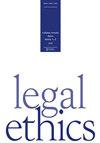A temporary ‘fix’ for a permanent problem: the appointment of auxiliary judges in South Australia
IF 0.3
Q1 LAW
引用次数: 0
Abstract
In early April 2016 it came to public notice that the South Australian state government had sought to appoint three District Court judges to the superior Supreme Court on an auxiliary or temporary basis. This kind of appointment is not unusual within the Australian court system as cash-strapped state governments seek to add judicial officers to the ranks, without committing to the expense of a permanent judicial appointment. According to a statement made by the local Attorney General, ‘They are necessary from time to time to hear cases that may require specific legal expertise, or in cases where local judicial officers have a conflict of interest’. More broadly, however, they are being used to address caseload demands cheaply. In this case, however, the appointments did not play out as the government had hoped. One of the three District Court judges, Judge Barry Beazley, declined to take up the appointment. While he made no public statement as to his motivation, one media source suggested that his refusal was, according to ‘insiders’, as ‘he believes temporary judges won’t help the backlog and that the government should adequately resource the courts’. His reported decision was applauded by the local legal profession, with the Law Society President, David Caruso, stating he had ‘distinguished himself’. In Australia, judicial appointment is the gift of the executive and is not without episodes of considerable controversy. Most recently, the appointment of a Chief Magistrate to the position of Chief Justice of the Supreme Court of Queensland led to an unsightly judicial spat played out in newspapers across the nation, and ultimately to the resignation of the judicial officer in question. Despite a degree of concern about methods of appointment and a persistent lag in the appointment of a diverse judiciary,一个永久性问题的临时“解决方案”:在南澳大利亚任命辅助法官
2016年4月初,公众注意到,南澳大利亚州政府试图任命三名地区法院法官作为辅助或临时法官进入最高法院。这种任命在澳大利亚法院系统中并不罕见,因为资金紧张的州政府寻求增加司法官员,而不承诺支付永久性司法任命的费用。根据当地司法部长的一份声明,“他们有时是必要的,以审理可能需要特定法律专业知识的案件,或者在当地司法官员有利益冲突的案件中。”然而,更广泛地说,它们正被用来廉价地解决大量案件的需求。然而,在这种情况下,任命并没有像政府希望的那样发挥作用。三名地区法院法官之一的巴里·比兹利(Barry Beazley)法官拒绝接受这一任命。虽然他没有就自己的动机发表公开声明,但据“内部人士”透露,一位媒体消息人士表示,他拒绝的原因是“他认为临时法官无助于解决积压的案件,政府应该为法院提供足够的资源”。据报道,他的决定受到了当地法律界的赞扬,法律协会主席大卫·卡鲁索(David Caruso)表示,他“表现出色”。在澳大利亚,司法任命是行政部门的礼物,并不是没有相当大的争议。最近,一名首席法官被任命为昆士兰州最高法院首席大法官的职位,导致了一场不体面的司法口水战在全国各地的报纸上上演,并最终导致有关司法官员辞职。尽管人们对任命的方法有一定程度的关切,而且在任命多元化的司法机构方面一直滞后,
本文章由计算机程序翻译,如有差异,请以英文原文为准。
求助全文
约1分钟内获得全文
求助全文

 求助内容:
求助内容: 应助结果提醒方式:
应助结果提醒方式:


